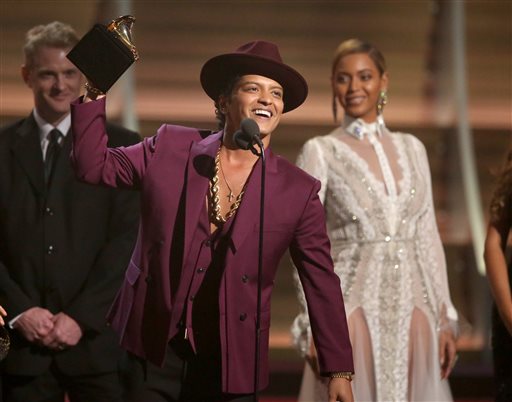
Bruno Mars accept the award for record of the year for Uptown Funk at the 58th annual Grammy Awards on Monday, Feb. 15, 2016, in Los Angeles. AP
LOS ANGELES, United States — After recognizing eclectic musicians in recent years, the latest Grammys have gone to some of the best-sellers — a meeting, deliberate or not, of the industry’s top honors with popular taste.
The most prestigious award, Album of the Year, had an unusually diverse range of nominees including meditative rapper Kendrick Lamar, indie rock sensation Alabama Shakes and late-blooming country singer Chris Stapleton.
But the music professionals voted to give Monday’s prize to Taylor Swift’s “1989,” one of the top-selling albums of the past decade.
READ: Adele takes comfort in fast food after Grammys snafu | IN PHOTOS: Stars wow, shock at 2016 Grammys red carpet
Record of the Year went to “Uptown Funk,” the retro party anthem by Mark Ronson featuring Bruno Mars that spent a near-historic 14 weeks on top of the US Billboard chart.
Song of the Year, which recognizes songwriters, went to Ed Sheeran’s romantic “Thinking Out Loud” which broke a Spotify streaming record, while Best New Artist went to Meghan Trainor, who has quickly become a household name with “All About That Bass,” a tongue-in-cheek play on body size.
It is hardly unusual for the Grammys to honor the music industry’s stars, but this year marked a reverse of recent trends.
READ: Taylor Swift wins top Grammy Award, Kendrick Lamar wins 5
Last year Beck, the alternative rocker revered in art house circles for his inventiveness, won Album of the Year for “Morning Phase,” beating out far better-selling competitors.
Canadian indie rockers Arcade Fire pulled off a similar upset against bigger names in 2011.
Other recent winners include robot-clad French electronic duo Daft Punk and English folk revivalists Mumford and Sons, although both acts enjoyed commercial success.
Neil Portnow, president of the Recording Academy which administers the Grammys, said that the awards recognized excellence regardless of chart performance but that there was no contradiction in bestowing accolades on successful artists.
“For me, being a musician and coming out of the music industry, I never thought that commercial music – ‘commercial’ — is a dirty word,” he said.
“Commercial music is equally hard to create, there is a lot of skill to it, and it means touching millions and millions of people all across the world. That’s a big accomplishment,” he said.
Swift credits hard work
Many top winners have enjoyed critical acclaim along with high sales.
Ronson, a 40-year-old British producer who has emerged as a star in his own right, is widely respected for his work with major artists such as Adele and Amy Winehouse.
Yet the winners also carry much of the music industry’s weight on their shoulders.
Swift and Adele, whose latest album came out too late for contention, together have revived global album sales and are the two most prominent critics of the pay structure in the growing industry of streaming.
Swift, 26, noted in her acceptance speech she was the first woman to win Album of the Year twice and urged fellow young women to stay focused and be proud of their accomplishments.
“I want to say to all the young women out there — there are going to be people along the way who will try to undercut your success or take credit for your accomplishments or your fame,” Swift said.
Her comment was seen in part as a swipe at rapper Kanye West, who on his latest album says, “I feel like me and Taylor might still have sex / Why? I made that bitch famous.”
West, the husband of reality television star Kim Kardashian, was apparently referring to the 2009 MTV Video Music Awards where he drew attention to Swift’s victory by interrupting to protest that Beyonce should have won.
Paradoxically, West is an outspoken advocate of Grammys going to top commercial performers and voiced anger last year at Beck’s victory.
Changing industry
In contrast to the Grammys, the rival American Music Awards unabashedly awards commercial success by calculating votes from fans.
Swift has won its Artist of the Year a record three times and the latest winner was British boy band One Direction, which has never been nominated for a Grammy.
Lamar, whose experimental rap opus “To Pimp a Butterfly” reflects on the state of black America, took home the night’s most Grammys at five, but all were in rap categories except Best Music Video — which he won for an appearance with Swift.
Mainstream tastes were also on display in the two dance/electronic awards which both went to Skrillex and Diplo, the hit-making Los Angeles producers who crafted celebrity Justin Bieber’s new sound.
Yet three Grammys also went to Alabama Shakes, who rose from obscurity in the small town of Athens, Alabama amid critical acclaim for the thundering yet bluesy voice of singer Brittany Howard, a former mailwoman.
Howard was unconcerned by the triumph of major acts, saying that the evolving music industry offered more opportunities to independent acts such as Alabama Shakes.
“There are so many different ways to share music and listen to music. So the future is great for anyone who wants to make this a living,” she said.